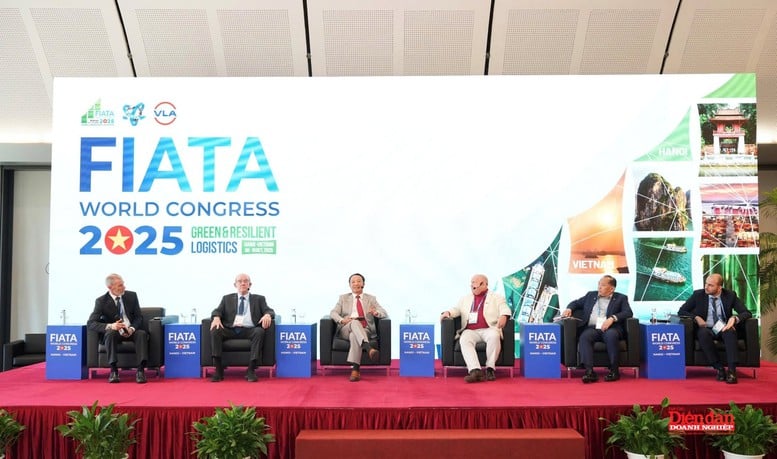
Experts shared at the discussion session: "Improving the adaptive and resilient capacity of the supply chain - Multidimensional perspective" - Photo: VGP
Cooperation for sustainable development
Continuing the activities within the framework of FIATA World Congress 2025, on October 9, in Hanoi , experts shared about challenges and experiences in improving the "resistance" of the supply chain at the discussion session "Improving the adaptive and resilient capacity of the supply chain - Multidimensional perspective".
Speaking at the discussion session, Mr. Nguyen Quang Vinh, Vice President of the Vietnam Confederation of Industry (VCCI), emphasized the importance of the policy system in creating a favorable environment for businesses to develop circular economic models and sustainable practices.
According to the VCCI representative, over the past three decades, policies have always played a key role in all aspects of business development. Good policies not only reflect national governance capacity but also demonstrate the adaptability of each organization in a complex economic context. All are aimed at improving competitiveness, promoting productivity and flexibility, not only within Vietnam but also expanding to ASEAN.
At VCCI, many policy initiatives are being implemented to help businesses increase their resilience. In addition to aiming for decarbonization, VCCI also focuses on sharing and disseminating international experiences and developing the Corporate Sustainability Index (CSI) – a tool to support businesses to operate more effectively in a volatile environment.
Mr. Vinh emphasized that the application of advanced technologies such as artificial intelligence and blockchain to help trace origins and predict risks in logistics and agriculture will enhance transparency and sustainability for the supply chain.
"In 35 years of working with many international organizations, I have found that cooperation and partnership are always the key to overcoming difficulties. From responsible supply chains to sustainable development, all aim to protect people, respect nature and use social resources effectively," Mr. Vinh affirmed.
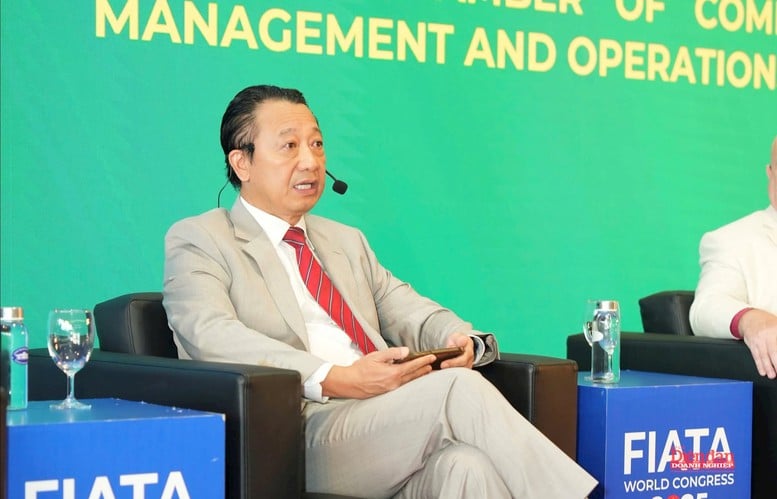
Mr. Nguyen Quang Vinh, Vice President of Vietnam Confederation of Industry (VCCI) shares information - Photo: VGP
Connecting resources – Increasing supply chain resilience
Besides policy factors, international experts also emphasized that cooperation between the Government, businesses and international organizations is a key factor in helping the supply chain maintain stability in the face of climate change and trade fluctuations.
Mr. Peter Lim, Vice President of the Singapore Logistics Association, shared the experience of the island nation in promoting public-private partnerships to rebuild infrastructure and train logistics human resources, ensuring uninterrupted digital operations even during the COVID-19 period. Singapore is currently continuing to invest in expanding airports and seaports, increasing passenger and cargo service capacity, considering this as the foundation for long-term resilience.
David Yokeum, President of WCAworld, said that digital technology and favorable policies are the two pillars of ensuring a strong supply chain. The global network of 14,000 logistics companies in 193 countries is shifting from a “just-in-time” to a “pre-emptive” model, balancing efficiency and responsiveness. While technology is a significant enabler, he stressed that the human factor and trust remain the irreplaceable foundation for cross-border cooperation.
Drawing on international experience, Mr. Mike Reid, Supply Chain Director of Central Retail Group, believes that to increase flexibility, Vietnam needs to simplify procedures, remove administrative barriers, and promote proactive supply chain management thinking, thereby increasing the ability to respond to fluctuations.
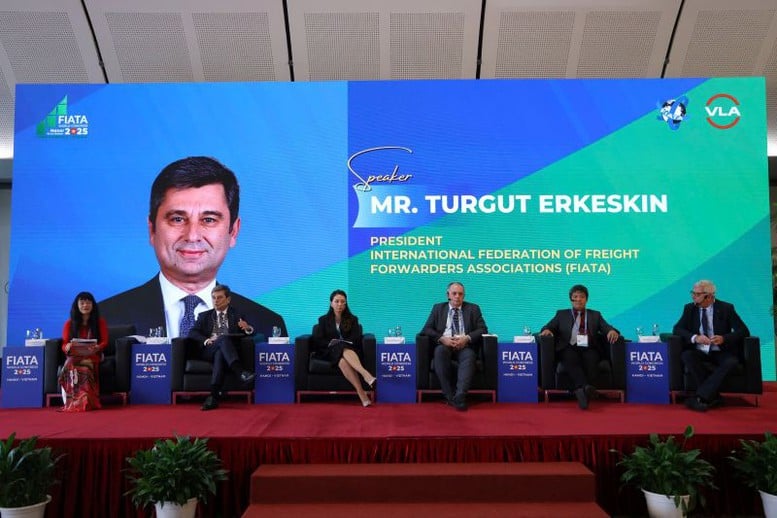
Experts discussed the topic "New generation economic and transport corridors - Connecting regions for global integration" - Photo: VGP
On the same day, at the session "New generation economic and transport corridors - Regional connectivity for global integration", experts commented: In the context of trade and geopolitical instability, experts said that the world is forming new generation economic corridors, connecting infrastructure, legal, financial and digital technology. Mr. Turgut Erkeskin, President of FIATA, said that this is an interactive "economic ecosystem", helping to create a new development space for international trade.
Mr. Turgut Erkeskin emphasized that these corridors are only effective when they are synchronized in terms of regulations, technology and multimodal transport models, not competing but complementing each other. Models such as the "Middle Corridor" (China - Kazakhstan - Azerbaijan - Georgia - Türkiye - Europe) are examples of viable alternative routes, helping trade to remain smooth in the face of fluctuations.
Regarding digital infrastructure, Ms. Zhanar Bagasharova, Business Development Director of Global DTC (PSA Group), introduced the Digital Trade Corridor platform - a digital trade system across Asia and Europe that integrates port, customs and logistics data into the same platform. Thanks to that, the time for declaring transit goods has been shortened from 8 hours to 30 minutes, helping to track goods in real time in 12 countries.
“Digital transformation not only brings efficiency but also builds trust through transparency and reliability,” said Ms. Zhanar Bagasharova.
The biggest challenge today is the legal disparity and the level of digitalization between countries, said Fedor Kormilitsyn, representative of the United Nations Economic and Social Commission for Asia and the Pacific (ESCAP). Mr. Fedor Kormilitsyn said that ESCAP is promoting the green corridor and digital corridor models, aiming for a unified legal framework to reduce costs and customs clearance times.
According to Francesco Parisi, Chairman of the Francesco Parisi Group, the experience of implementing Europe's TEN-T (Trans-European Transport Network) network shows that soft infrastructure such as regulations and technology must come before hard infrastructure. "Sometimes two small parallel lines are more efficient than one large line, because redundancy makes the system more flexible," he said.
Regarding finance, Dr. Nguyen Ba Hung - Chief Economist in Vietnam of ADB said that infrastructure construction is a necessary condition, but financial and trade policies are sufficient conditions. Vietnam needs to promote public-private partnership (PPP) and develop supply chain finance so that small businesses can access capital more easily.
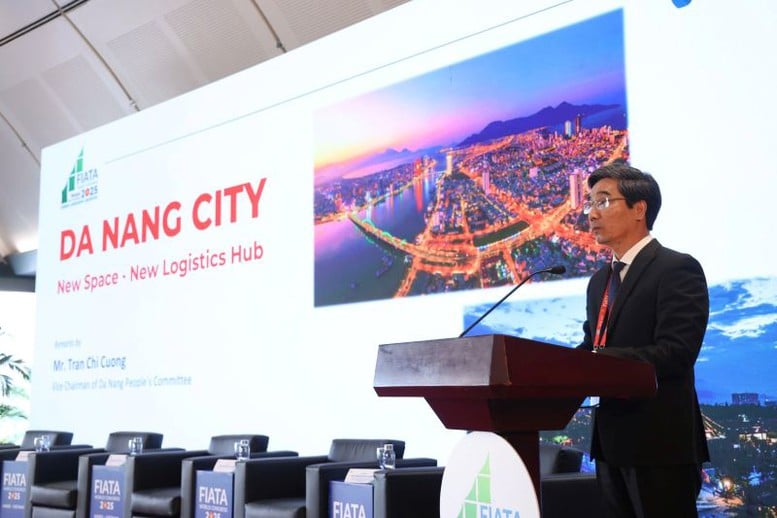
Mr. Tran Chi Cuong, Vice Chairman of Da Nang City People's Committee - Photo: VGP
In Southeast Asia, Vietnam is emerging as a strategic transit point in regional logistics routes. Mr. Tran Chi Cuong, Vice Chairman of the People's Committee of Da Nang City, said that the merger with Quang Nam expands the development space to 12,000 km², creating a foundation for the city to become an international logistics, high-tech and financial center in the Central region.
Lien Chieu Port and the 19,000-hectare Free Trade Zone are being promoted, linked to plans to form the Da Nang International Financial Center and the "Central Silicon Valley".
"Da Nang is ready to become a reliable partner of global investors," affirmed Mr. Tran Chi Cuong.
However, some international businesses still raised concerns about customs procedures and clearance times. ADB representatives said that Vietnam is in the process of strong reforms and needs more quantitative data to adjust policies.
"We don't just need to invest more, we need to invest smarter," said Mr. Tran Chi Cuong.
The FIATA World Congress 2025 with the theme "Green and Resilient Logistics" lasted from October 6 to 10, along with a series of agenda activities, seminars - FIATA World Congress 2025 Exhibition also attracted the attention of the business community, the event not only helps businesses promote their image, but is also an opportunity to connect businesses with the international market. On the afternoon of October 8, in Hanoi, General Pham Minh Chinh attended and spoke at the largest annual event of the world logistics industry.
Mr. Minh
Source: https://baochinhphu.vn/viet-nam-no-luc-la-diem-ket-noi-moi-cua-chuoi-logistics-khu-vuc-102251009192639664.htm




![[Photo] Unique Phu Gia horse hat weaving craft](https://vphoto.vietnam.vn/thumb/1200x675/vietnam/resource/IMAGE/2025/10/10/1760084018320_ndo_br_01-jpg.webp)
![[Photo] Ho Chi Minh City is brilliant with flags and flowers on the eve of the 1st Party Congress, term 2025-2030](https://vphoto.vietnam.vn/thumb/1200x675/vietnam/resource/IMAGE/2025/10/10/1760102923219_ndo_br_thiet-ke-chua-co-ten-43-png.webp)

![[Photo] Opening of the World Cultural Festival in Hanoi](https://vphoto.vietnam.vn/thumb/1200x675/vietnam/resource/IMAGE/2025/10/10/1760113426728_ndo_br_lehoi-khaimac-jpg.webp)




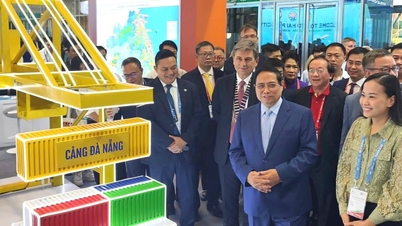

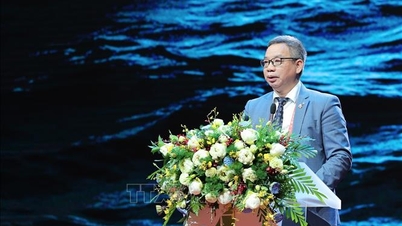

































































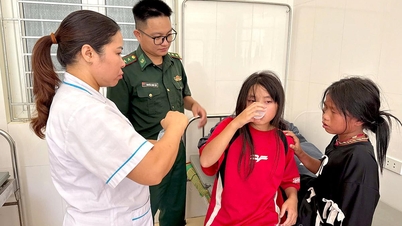

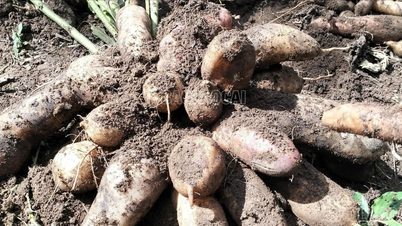




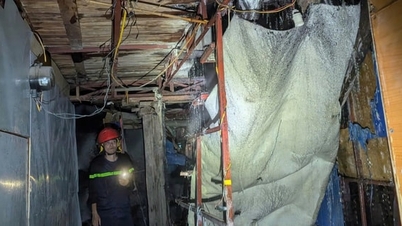














Comment (0)